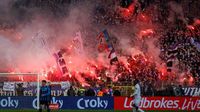The Belgian Cup final on May 4, 2025, was overshadowed by chaos and violence as tensions erupted between supporters of Club Bruges and Anderlecht. The match, which saw Club Bruges emerge victorious, was marred by a series of violent altercations that left many injured and raised serious concerns about public safety during sporting events.
As the day unfolded, incidents began to occur in various neighborhoods across Brussels. The first reports of clashes emerged in the city center, particularly near the Gare Centrale, where Bruges supporters allegedly provoked Anderlecht fans. Police were quickly dispatched to separate the two groups and restore order. However, the situation escalated dramatically in Molenbeek, where a group of around 100 hooded individuals armed with clubs launched a violent attack on passersby in the Ribaucourt area.
Eyewitness accounts describe a terrifying scene as the attackers vandalized a local tile shop, throwing projectiles to break windows and allegedly using gas canisters to target the shop owners. "My brother and my nephew were beaten by a group of at least 50 people. They are in the emergency room right now," said the sister of the shop owner, who had recently undergone major surgery. Her nephew sustained serious injuries to his face during the assault.
In addition to the violence in Molenbeek, another incident occurred near the Planetarium of the Royal Observatory of Belgium in Laeken, where a person suffered a severe hand injury due to fireworks. According to Ilse Van de Keere, spokesperson for the Brussels-Capital/Ixelles police, "Unfortunately, we have seen the use of fireworks, which resulted in a serious injury to a person's hand." This incident prompted further police intervention, with approximately ten administrative arrests reported during the day.
The chaotic atmosphere continued to unfold as the evening approached. Around 10 PM, Bruges supporters faced vicious attacks in the metro, particularly at Gare du Nord station. Victims recounted harrowing experiences of being assaulted by young people from Brussels, some of whom were armed with knives or glass bottles. "I was on my scooter, trying to pass, and suddenly someone struck me in the face. Thankfully, I was wearing my helmet," one victim shared, highlighting the overwhelming nature of the attacks.
In the aftermath, social media was flooded with complaints from Brussels residents who criticized the police for their perceived inaction during the earlier confrontations. "We saw with our own eyes that the police were aware of the hooligans but did nothing," lamented one local on social platforms. The calls for accountability grew louder, with many questioning the adequacy of police presence in a neighborhood known for its heightened surveillance and numerous security cameras.
The Belgian Cup final, which was supposed to celebrate football, instead became a day of violence and fear. According to the SPF Santé publique, based on data from the Belgian Red Cross and the 112 Brussels emergency center, a medical report established at 8:00 PM indicated that 80 people were assisted by emergency services, with nine requiring transport to a hospital, including the supporter who suffered a severe hand injury from a firework.
Police reiterated their commitment to ensuring the safety of all supporters, urging fans to respect the rules and behave responsibly. "We continue to mobilize to ensure the safety of all supporters and ask everyone to respect the rules and adopt a respectful attitude towards others," the police stated in a press release following the events.
As the dust settles on a day that was meant to be a celebration of Belgian football, the repercussions of the violence remain clear. The incidents have sparked discussions about fan safety, police preparedness, and the need for stricter regulations to prevent such chaos in the future. The authorities are now faced with the challenge of restoring public confidence in the safety of sporting events and ensuring that such violent outbursts do not mar the spirit of competition.
With the Belgian Cup final now behind them, both Club Bruges and Anderlecht must reflect on the events that unfolded. While Bruges may savor their victory, the shadows of violence and unrest linger, casting a pall over what should have been a day of sporting triumph.




